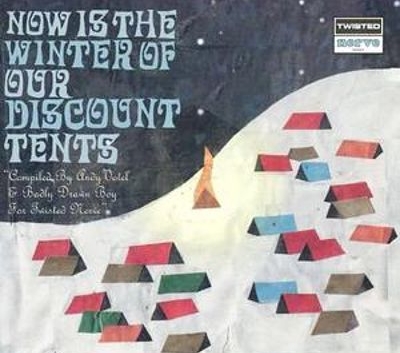By The Landlord
“Selling is essentially a transfer of feelings.” – Zig Ziglar
“The story of the human race is the story of men and women selling themselves short.” – Abraham Maslow
“If government were a product, selling it would be illegal.” – PJ O’Rourke
“Man is an animal that makes bargains: no other animal does this - no dog exchanges bones with another.” Adam Smith
“No one should drive a hard bargain with an artist.” – Beck
I didn’t know what would happen the moment I’d knocked that knocker, or buzzed that bell. Perhaps that was as much the thrill as the fear. Just about anything could occur. From a huge-breasted woman in a skimpy nightie inviting me into to “stir her cocoa”, to a massive Irish bloke with knuckles the size of golf balls threatening to knock me into next week, to a bearded lady with a mad, scampering menagerie of cats, ferrets and weasels, even to being asked urgently in to change the fuse on a life-support machine and then manically assist with cardiopulmonary resuscitation. From the very poor to the posh, I’d have to change my approach instantly, turn on a sixpence, according to the demographic, appearance, accent and demeanour of the house occupant, all across many parts of urban Manchester, standing there in my Smiths-era trenchcoat.
And one time, I was even utterly dumbstruck, when, opening the door to a largish house in Chorlton-cum-Hardy, a certain long-retired Sir Matt Busby answered the door. “Er … good evening,” I stuttered. “I’m sorry to disturb you. I’m just calling in case you might be interested in getting loft insulation. It’ll cut down on your heating bills and there’s a government grant that can give you up to 85% of the cost to get it topped up.”
“Thank you, but no, laddie. We’ve already got it. But good luck to you anyway.”
Selling loft insulation with a “Get More For Your Monergy” grant was probably more of an education than anything I’d done at school, or later, at university. And anyone who has worked in a shop, bought or sold anything, will know that the moment of transaction can be as anonymous as it can be intimate between strangers. Who has not been seduced by the prospect of a bargain, by the urgency of how long stocks might last, and this week our topic is all about the culture and experience of selling, sales, bargains and bargaining, especially at this time of year, as the economy, and January sales, grind on?
After all, songwriters and performers have to sell their songs, and these days, most have to do the business side of it too. But before we get into that, let’s take a lesson from the master, Minder’s dodgy car-and-much-more-dealing Arthur Daley, showing a young woman how it’s done.
Sometimes, however, not all customers are satisfied, and Daley just has to grovel a bit, but uses such a turn of phrase, it only be admired:
“The salesman knows nothing of what he is selling save that he is charging a great deal too much for it,” said Oscar Wilde. But if nothing else, there may be no bargains, and nothing but ripoffs, selling can at least offer an element of theatre, and it can definitely inspired many a great song.
Aside from all the cliches, the "seven steps to selling", the Daleys, the Del-Boys, the market traders, the psychology of bargaining, what happens between people during a sale is fascinating, but it can also be dangerously addictive. Shopping centres are society’s new Saturday churches, a mecca to gather in, peruse, carouse and covet. People, very sadly, don't just go to shops to buy what they need, but to find some kind of peripheral socialising, some company, some sort of meaning.
And fights can even break out at the prospect of buying something you don’t really need cheaper than the apparent usual price, such as in 2005 at the opening of a branch of Ikea in Edmonton, north London, where 20 people were injured trying to buy sofas for £45. The same occurred in the 1980s with a collective madness in the US over the Cabbage Patch Doll, and over the past decade there is, in my mind at least, even more sinister quasi-religious camping overnight queues of Apple-obsessed nerds awaiting the latest iPhone or whatever. As Alice Walker put it: “Well, capitalism is a big problem, because with capitalism you're just going to keep buying and selling things until there's nothing else to buy and sell, which means gobbling up the planet.” Still, how else might you sell your book? Selling inevitably brings contradiction and compromise.
January sales can get a little out of hand …
But on the music side, Steve Jobs, before the strain overcame him, proudly remarked: “Now, we are selling over 5 million songs a day now. Isn't that unbelievable? That's 58 songs every second of every minute of every hour of every day.” Shame the artists got fractions of pennies for these, though, eh Steve? Meanwhile, who can forget Bono’s remark: “Selling out is doing something you don't really want to do for money. That's what selling out is.” Are we therefore assuming you and the other U2 guys actually wanted to foist your rubbish album Songs of Innocence, on all iTunes Apple owners, for free, then?
Step right up, I shout, and suddenly there’s a flood of musicians coming into the Bar to tell us more about selling music. “Just sharing music with each other – that's cool. It's the selling that becomes the problem,” says Prince. Oh well, at least we’re cool here, according to Mr Nelson, but the Bar’s mission is also to promote music, which we hope will also help increase sales. And here’s Jeff Buckley: “The music business is the most childish business in the world. Nobody knows what they're selling or why, but they sell it if it works.”
“That’s right, man,” replies Frank Zappa. “Art is making something out of nothing and selling it.” But Frank has much more to say about the crass commercialisation of the music industry too. Meanwhile: “Half the battle is selling music, not singing it. It's the image, not what you sing,” pipes up Rod Stewart. “There are a lot of musicians who are still desperately trying to pretend that it's 1998 and by having a huge marketing campaign, they somehow believe that they can sell 10 million records. That's delusional. No one sells 10 million records. The days of musicians getting rich off of selling records are done.” says Moby, who managed to cash in while the going was still good. “Now the music industry is sort of like a Craigslist venture, right? Where you're making your own records and selling them online,” says Gus Van Sant. Correcto mundo, Gus.
Sometimes we go about selling products and ourselves the wrong way, and it can all get out of hand. “The advertisers who believe in the selling power of jingles have never had to sell anything. said the agency behemoth David Ogilvy. The selling, then, can somehow become more important than the product being sold. And as a lifestyle, as shown in Arthur Miller’s great play, and this film adaptation starring Dustin Hoffman and John Malkovich, it can also become psyhologically dangerous:
Manchester’s great music enthusiast Tony Wilson trod a usual line between selling himself and promoting the Factory label bands he loved. Here is is talking about himself with that classic mixture of modesty and self-aggrandisement. “Richard Branson once said: 'Tony's very good at selling bands and he's very good at making television programmes. But he'll never be great at either, until he decides which one he wants to do.' I entirely accept that. That doesn't matter to me very much. I like the irony of the two lives.” And on another scale of immodesty, Felix Dennis, the early hero of 1967’s OZ magazine, but later massive publisher of glossy magazines such as Maxim, as well as being a super-rich philanthropist, announced: “I'm very proud of the fact that I'm one of Britain's biggest selling poets. That gives me a huge amount of pleasure.”
So where do you draw the line, with creativity and selling? I remember going to a very early exhibition where the graffiti artist Banksy’s works were on sale for the first time. Outside, protesters had, ironically, daubed on a wall in white paint, “Banksy! You sellout.” How do you respond to that? “There’s obviously nothing wrong with selling your art – only an idiot with a trust fund would tell you otherwise. But it's confusing to know how far you should take it.” said the artist. Fair point. And what after all, is for sale when it comes to any kind of art? Is it paint and brick, or an idea, a feeling, an identity who find for yourself, or being part of something? Perhaps all artists and buyers are just pieces, complicit in all of this, and as David Bowie gnomically put it, “Andy Warhol looks a scream, hang him on my wall.”
I’ve also experienced selling that isn’t really selling at all. In my earlier days of eventually becoming a writer for money, and arriving in London, I was simultaneously helping run a wonderfully eccentric second-hand and antiquated bookshop in Islington. The owner was one of the most bizarre characters too, among many of the customers who visited. Articulate alcoholics, eccentric academics, actors and other celebrities regularly trooped in to peruse, while I cranked up the old coffee machine and percolated ideas and gossip and more. I had banter and cups with all sorts, from Jarvis Cocker to Juliette Binoche, Michael Nyman to Mike Leigh. The place was filled with dust, dirt and banter. It was more Black Books than Black Books, (and in fact I wrote and sent off a very a sitcom script before it, which … but that’s another story). It was selling, but also anti-selling. Like all good second-hand shops, sometimes when we were in middle of fun socialising, the customers were just mere distraction. After all, who is going to let a sale get in the way of a good story? And many more stories will gradually unfold from that time during my tenure here at the bar.
So how are sales really made? I’ve known art dealers dancing about dukes, dodgy drug dealers, the art of retail science, placing products next to each other, or piping shops with the smell of bread, or chocolate, but the real deal comes down to one thing. Johnny Depp, when he’s finished selling out those Pirate movies, now pops into the bar to say, morosely: “Tomorrow it'll all be over, then I'll have to go back to selling pens again.” Well, then, how do you sell a pen? In the Martin Scorsese film, 2013’s The Wolf of Wall Street, starring Leonardo DiCaprio as the real-life Jordan Belfort, whose career as a dodgy stockbroker was even more outrageous and excessive than that portrayed in the film, we see how it’s done, and also not. As shown in these early and later clips, just have to create a demand in the buyer’s mind:
So then, this week’s chief salesman and marvellous music promoter, compiling playlists from your suggestions, is the excellent EnglishOutlaw. Place your song products in comment boxes below in time last orders on Monday UK time 11pm, and playlists published on Wednesday. The doors are open! Time for the bargaining to begin …
New to comment? It is quick and easy. You just need to login to Disqus once. All is explained in About/FAQs ...
Fancy a turn behind the pumps at The Song Bar? Care to choose a playlist from songs nominated and write something about it? Then feel free to contact The Song Bar here, or try the usual email address.



